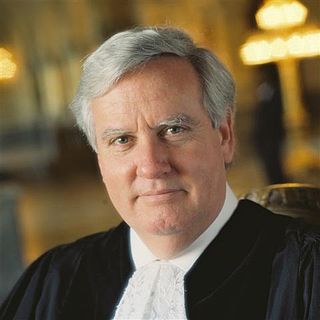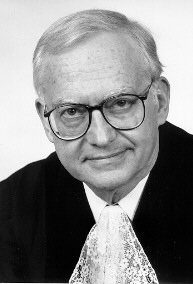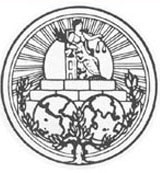
The International Court of Justice, or colloquially the World Court, is the only international court that adjudicates general disputes between nations, and gives advisory opinions on international legal issues. It is one of the six organs of the United Nations (UN), and is located in The Hague, Netherlands.

A United Nations Security Council resolution (UNSCR) is a United Nations resolution adopted by the Security Council (UNSC), the United Nations (UN) 15-member body charged with "primary responsibility for the maintenance of international peace and security".

Taslim Olawale Elias was a Nigerian jurist who served as minister of Justice and attorney-general of Nigeria from 1960 to 1966, Chief Justice of Nigeria from 1972 to 1975 and president of the International Court of Justice from 1982 to 1985. He was a scholar who modernised and extensively revised the laws of Nigeria.

Sir Christopher John Greenwood is Master of Magdalene College, Cambridge and a former British judge at the International Court of Justice. Prior to his election, he was professor of international law at the London School of Economics and a barrister who regularly appeared as counsel before the International Court of Justice, the European Court of Human Rights, the English courts, and other tribunals.
Nawaf Abdallah Salim Salam is a Lebanese politician, diplomat, jurist and academic who is the prime minister-designate of Lebanon.

Northern Cyprus declared its independence in 1983 with its official name being the Turkish Republic of Northern Cyprus (TRNC). It is recognized by Turkey.

United Nations Security Council resolution 550, adopted on 11 May 1984, after hearing representations from the Republic of Cyprus and reaffirming resolutions 365 (1974), 367 (1975), 541 (1983) and 544 (1983), the council condemned the illegal secessionist activities in the occupied part of the Republic of Cyprus from Turkey, in violation of the previous resolutions.

United Nations Security Council resolution 595, adopted unanimously on 27 March 1987, after noting the death of International Court of Justice (ICJ) judge and Vice President Guy Ladreit de Laucharrière on 10 March, the council decided that elections to the vacancy on the ICJ would take place on 14 September 1987 at the Security Council and at the General Assembly's 41st session.

United Nations Security Council resolution 627, adopted unanimously on 9 January 1989, after noting the death of International Court of Justice (ICJ) President Nagendra Singh on 11 December 1988, the council decided that elections to the vacancy on the ICJ would take place on 18 April 1989 at the Security Council and at the General Assembly's 43rd session.

United Nations Security Council resolution 805, adopted unanimously on 4 February 1993, after noting the death of International Court of Justice (ICJ) judge Manfred Lachs on 14 January 1993, the Council decided that elections to the vacancy on the ICJ would take place on 10 May 1993 at the Security Council and at a meeting of the General Assembly during its 47th session.

United Nations Security Council Resolution 1914, adopted unanimously on 18 March 2010, after noting the resignation of International Court of Justice (ICJ) judge Shi Jiuyong and that the vacancy must be filled in accordance with the Statute of the ICJ, the Council decided that the election to fill the vacancy would take place on 29 June 2010 at a meeting of the Security Council and at a meeting of the General Assembly at its 64th session.

United Nations Security Council resolution 951, adopted without a vote on 21 October 1994, after noting the death of International Court of Justice (ICJ) judge Nikolai Konstantinovitch Tarassov on 28 September 1994, the Council decided that elections to the vacancy on the ICJ would take place on 26 January 1995 at the Security Council and at a meeting of the General Assembly during its 49th session.

United Nations Security Council resolution 979, adopted without a vote on 9 March 1995, after noting the death of International Court of Justice (ICJ) judge Roberto Ago on 24 February 1995, the Council decided that elections to the vacancy on the ICJ would take place on 21 June 1995 at the Security Council and at a meeting of the General Assembly during its 49th session.

United Nations Security Council resolution 980, adopted without a vote on 22 March 1995, after noting the resignation of International Court of Justice (ICJ) judge Sir Robert Yewdall Jennings which would take effect on 10 July 1995, the council decided that elections to the vacancy on the ICJ would take place on 12 July 1995 at the security council and at a meeting of the General Assembly during its 49th session.

United Nations Security Council resolution 1018, adopted unanimously on 7 November 1995, after noting the death of International Court of Justice (ICJ) judge Andrés Aguilar-Mawdsley on 24 October 1995, the Council decided that elections to the vacancy on the ICJ would take place on 28 February 1996 at the Security Council and at a meeting of the General Assembly during its 50th session.

United Nations Security Council resolution 1278, adopted without a vote on 30 November 1999, after noting the resignation of International Court of Justice (ICJ) judge Stephen M. Schwebel taking effect on 29 February 2000, the council decided that elections to the vacancy on the ICJ would take place on 2 March 2000 at the security council and at a meeting of the General Assembly during its 54th session.

United Nations Security Council resolution 1361, adopted without a vote on 5 July 2001, after noting the resignation of International Court of Justice (ICJ) judge Mohammed Bedjaoui taking effect on 30 September 2001, the council decided that elections to the vacancy on the ICJ would take place on 12 October 2001 at the security council and at a meeting of the general assembly during its 56th session.

Joan E. Donoghue is an American lawyer, international legal scholar, former U.S. State Department official, and former president of the International Court of Justice (ICJ). She was first elected to the court in 2010, re-elected in 2014, and elected by the ICJ judges to be president of the ICJ in 2021. She was the third woman to be elected to the ICJ and the first American woman elected as president of the court.

United Nations Security Council resolution 1571, adopted without a vote on 4 November 2004, after noting the resignation of International Court of Justice (ICJ) judge Gilbert Guillaume taking effect on 11 February 2005, the council decided that elections to the vacancy on the ICJ would take place on 15 February 2005 at the security council and at a meeting of the General Assembly during its 59th session.
Julia Sebutinde is a Ugandan jurist. She is currently serving her second term on the International Court of Justice (ICJ) following her re-election on 12 November 2020. She also is the current chancellor of Muteesa I Royal University, a university owned by Buganda kingdom. She has been a judge on the court since March 2012. She is the first African woman to sit on the ICJ. Before being elected to the ICJ, Sebutinde was a judge of the Special Court for Sierra Leone. She was appointed to that position in 2007.














